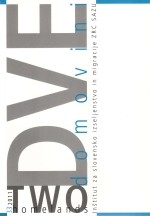A Europe of Homelands or Homeland Europe: (European) Identity Issues
Keywords:
Europe, identity, European UnionAbstract
This paper addresses identity issues in Europe in the context of the free fl ow of people within the EuropeanUnion and therefore the creation and reinforcement of complex parallel individual and also collectiveidentities. The authors’ premises are current EU perspectives on migration and the interconnectionof migration and identity issues. Based on the substantial body of literature on the topic, the authorsconfront various theorisations of collective identities with the political project on European identity,emphasising in particular European nationalisms, social and other identities in relation to Europeanidentity and the (ab)use of the latter as a political instrument. In the conclusion, the authors suggest keyresearch issues to orient the scientifi c research in this fi eld in the future.
Downloads
References
Althusser, Louis (2000). Izbrani spisi. Ljubljana: *cf.
Anderson, Benedict (2006). Imagined Communities: Refl ections on the Origin and Spread of Nationalism. London and New York: Verso.
Appadurai, Arjun (2000). Modernity at Large: Cultural Dimensions of Modernity. London and Minneapolis: University of Minnesota Press.
Attali, Jacques (1994). Europe(s). Paris: Fayard.
Barker, Chris (2002). Making Sense of Cultural Studies: Central Problems and Critical Debates. London: Sage Publications.
Beck, Ulrich (2000). What Is Globalization? Cambridge: Polity Press.
Beck, Ulrich (2006). Those Who Play the National Card Lose. http://www.goethe.de/ges/eur/thm/eui/ en1767656.htm (March, 2007).
Beus, Jos de (2001). Quasi-National European Identity and European Democracy. Law and Philosophy 20(3): 283–311.
Bhabha, Homi K. (2004). Nation and Narration. London: Routledge.
Bijak, Jakub, Dorota Kupiszewska, Marek Kupiszewski, Katarszina Saczuk and Anna Kicinger (2007). Population and Labour Force Projections for 27 European Countries 2002–2052: Impact of International Migration on Population Ageing. Eur J Population 23: 1–31.
Billig, Michael (1995). Banal Nationalism. London: SAGE Publications.
Breuilly, John (1993). Nationalism and the State. Manchester: Manchester University Press.
Chatterjee, Partha (1993). The Nation and Its Fragments: Colonial and Postcolonial Histories. Princeton: Princeton University Press.
Craib, Ian (1998). Experiencing Identity. London: Sage Publications.
Delanty, Gerard (1995). Inventing Europe: idea, identity, reality. Houndmills: Macmillan Press.
Delanty, Gerard and Chris Rumford (2005). Rethinking Europe: social theory and the implications of Europeanisation. London: Routledge.
Du Gay, Paul, Evans, Jessica and Peter Redman (eds.) (2002). Identity: A reader. London: Sage Publications.
Gellner, Ernest (2006). Nations and Nationalism. London: Blackwell Publishing.
Goldsworthy, Vesna (2002). Invention and In(ter)vention: The Rhetoric of Balkanization. Balkan as Metaphor: Between Globalization and Fragmentation (ed. Dušan I. Bjelić, Obrad Savić). Massachusetts: The MIT Press, 25–38.
Grimm, Dieter (1997). Does Europe Need a Constitution? The Question of Europe (ed. Peter Gowan and Perry Anderson). London: Verso, pp. 239–258.
Habermas, Jürgen (1996). Between Facts and Norms. Cambridge: Polity.
Habermas, Jürgen (2001). Why Europe needs a Constitution? New Left Review 11 September/October: 5–26.
Hall, Stuart (1997). Representation: Cultural Representation and Signifying Practices. London: Sage.
Hobsbawm, Eric (1997). The Construction of Nationhood: Ethnicity, Religion and Nationalism. Cambridge: Cambridge University Press.
Kastoryano, Riva (2004). What Identity for Europe? http://www.lehigh.edu/~incntr/publications/kastoryano.wp.pdf, 14. 4. 2007.
Kuljić, Todor (2003). Kolektivni spomin in globalizacija. Revija 2000 153/154/155: 45–63.
Kymlicka, Will (2000). Multicultural Citizenship: a liberal theory of minority rights. Oxford: Clarendon Press.
Le Goff, Jacques (1994). La vieille Europe et la nôtre. Paris: Seuil.
Marks, Gary (1997). A Third Lens: Comparing European Integration and State Building. European Integration in Social and Historical Perspective – 1850 to the Present (ed. Jytte Klausen and Louise A. Tilly). Oxford: Rowman and Littlefi eld Publishers, 23–43.
Marks, Gary (1999). Territorial Identities in the European Union. Regional Integration and Democracy (ed. Jeff rey J. Anderson). Oxford: Rowman and Littlefi eld Publishers, 69–91.
Mead, George Herbert (1997). Um, sebstvo, družba. Ljubljana: Krtina.
Mikkeli, Heikki (1998). Europe as an Idea and an Identity. New York: Palgrave-St. Martin’s Press.
Morin, Edgar (1989). Kako misliti Europu. Sarajevo: Svjetlost.
Morris, Lydia (1997). Globalization, Migration and the Nation-State: the Path to a Post-National Europe? The British Journal of Sociology 48(2): 192–209.
Pavković, Aleksandar (2000). Constructing a European Identity: Problems of Supranationalism. Why Europe? Problems of Culture and Identity (ed. Joe Andrew, Malcolm Crook and Michael Waller). London: Macmillan Press Ltd, 115–128.
Rizman, Rudi (2003). Nacionalna in evropska identiteta: kohabitacija, sinergija ali konfl ikt? Prihodnost Evropske unije (ur. Slavko Gaber, Zlatko Šabič, Mitja Žagar). Ljubljana: Državni svet Republike Slovenije, 112–123.
Robertson, Roland (1995). Glocalization: Time-Space and Homogeneity-Heterogeneity. Global Modernities (ed. Mike Featherstone, Scott Lash, Roland Robertson). London: SAGE Publication, 25–44.
Rüsen, Jörn (2006). Future Directed Elements of a European Historical Culture. http://www.talaljuk-ki. hu/index.php/article/articleprint/428/-1/21/ (April 2007).
Siedentop, Larry (2001). Democracy in Europe. London: Penguin Books.
Smith, Anthony D. (1991). National Identity. London: Penguin Books.
Smith, Anthony D. (1992). National identity and the idea of European Union. International Aff airs 68(1): 55–76.
Šabec, Ksenija (2006). Homo europeus: nacionalni stereotipi in kulturna identiteta Evrope. Ljubljana: FDV (Zbirka Kult).
Toplak, Cirila (2003). Združene države Evrope: zgodovina evropske ideje. Ljubljana: FDV (Zbirka Politični procesi in inštitucije).
Velikonja, Mitja (2005). Eurosis – a Critique of the New Eurocentrism. Ljubljana: Mirovni inštitut.
Verdery, Katherine (1998). Uncertain Transition: Ethnographies of Change in the Postsocialist World. Blue Ridge Summit: Rowman & Littlefi eld Publishers.
Waever, Ole (1995). Identity, Integration and Security. Solving the Sovereignty Puzzle in E.U. Studies. Journal of International Aff airs 34: 103–132.
Woodward, K. (1997). Concepts of identity and diff erence. Identity and Diff erence (ed. Kathryn Woodward). London: Sage Publications, 7–62.
Downloads
Published
How to Cite
Issue
Section
License

This work is licensed under a Creative Commons Attribution-NonCommercial-NoDerivatives 4.0 International License.
Authors guarantee that the work is their own original creation and does not infringe any statutory or common-law copyright or any proprietary right of any third party. In case of claims by third parties, authors commit their self to defend the interests of the publisher, and shall cover any potential costs.
More in: Submission chapter





